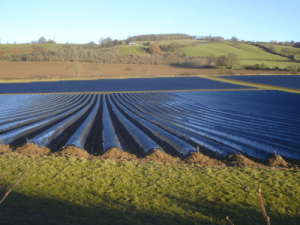Grow Bioplastics has been awarded a National Science Foundation (NSF) Small Business Innovation Research (SBIR) grant for $225,000 to conduct research and development (R&D) work on Lignin-Biomass Based Biodegradable Plastics for Agricultural Applications.
On farms around the country, farmers use plastic mulch films to block weeds, retain moisture in the soil, and increase their crop yields. Unfortunately, the non-degradable plastics they use must be removed after harvest and are often sent to a landfill, because they are difficult to recycle due to contamination by soil and pesticides. This leads to significant labor and disposal costs to farmers, and increases the environmental impact of this otherwise great technology.
In this proposal, Grow Bioplastics’ team, led by co-founders Tony Bova and Jeff Beegle, will create new biodegradable plastics from lignin, which is a waste product of the paper and biofuel industries, that will naturally biodegrade in farm soils into water, carbon dioxide, and compost. The new lignin-based plastics can then be plowed into the soil after use, allowing them to be used as replacements for petroleum-based plastics that are not biodegradable and difficult to recycle.

“The National Science Foundation supports small businesses with the most innovative, cutting- edge ideas that have the potential to become great commercial successes and make huge societal impacts,” said Barry Johnson, Director of the NSF’s Division of Industrial Innovation and Partnerships. “We hope that this seed funding will spark solutions to some of the most important challenges of our time across all areas of science and technology.”
“Being selected for this competitive award from the NSF is a huge step for our company,” said Tony Bova, CEO and Co-Founder of Grow Bioplastics. “We are very excited to announce two partnerships on this grant. The first with Glucan Biorenewables, LLC to use their novel gamma- valerolactone derived lignin streams, and the second with Dr. David Harper, Associate Professor at The University of Tennessee’s Center for Renewable Carbon, to help us evaluate the processability of our materials. This funding will help us validate the fundamental science behind our lignin-based plastic technology, allow us to hire our first employees here in East Tennessee, and bring us one step closer to realizing our vision for a socially and environmentally driven business model to support a circular economy.”
Once a small business is awarded a Phase I SBIR/STTR grant (up to $225,000), it becomes eligible to apply for a Phase II grant (up to $750,000). Small businesses with Phase II grants are eligible to receive up to $500,000 in additional matching funds with qualifying third-party investment or sales.
NSF accepts Phase I proposals from small businesses twice annually in June and December. Small businesses with innovative science and technology solutions, and commercial potential are encouraged to apply. All proposals submitted to the NSF SBIR/STTR program undergo a rigorous merit-based review process.
To learn more about the NSF SBIR/STTR program, visit: www.nsf.gov/SBIR.
About Grow Bioplastics

The founders of Grow Bioplastics believe that There’s Wonder in Waste. They envision a future where forestry, food, and agricultural waste streams are upcycled into valuable chemical and material feedstocks. Founded in 2016 by University of Tennessee Knoxville graduate students Tony Bova and Jeff Beegle, Grow Bioplastics is creating a technology platform for 100% bio-based, naturally degradable and compostable plastics that serve as drop-in replacements for petroleum based resins. Their compostable and in-soil degradable plastic technology uses lignin, the second most abundant natural biopolymer in the world and primary waste product of biorefineries and paper mills, as a low-cost primary feedstock. With their solvent-free and zero-waste process, they can tune their material composition, mechanical properties, and degradation characteristics, allowing customers to choose from a range of products dedicated to their specific needs. Their first products will be plastic pellets that can be processed into blown or cast plastic mulch films and thermoformed or injection molded trays and pots for agricultural and horticultural applications. They anticipate first commercial sales of their products to begin in 2019.
About the National Science Foundation’s Small Business Programs
The National Science Foundation (NSF) awards roughly $200 million annually to startups and small businesses through the Small Business Innovation Research (SBIR)/Small Business Technology Transfer (STTR) program, transforming scientific discovery into products and services with commercial and societal impact. The non-dilutive grants support research and development (R&D) across almost all areas of science and technology helping companies de-risk technology for commercial success. The NSF is an independent federal agency with a budget of about $7 billion that supports fundamental research and education across all fields of science and engineering.
Source
Grow Bioplastics, press release, 2018-01-24.
Supplier
Grow Bioplastics
National Science Foundation (USA)
University of Tennessee
Share
Renewable Carbon News – Daily Newsletter
Subscribe to our daily email newsletter – the world's leading newsletter on renewable materials and chemicals









